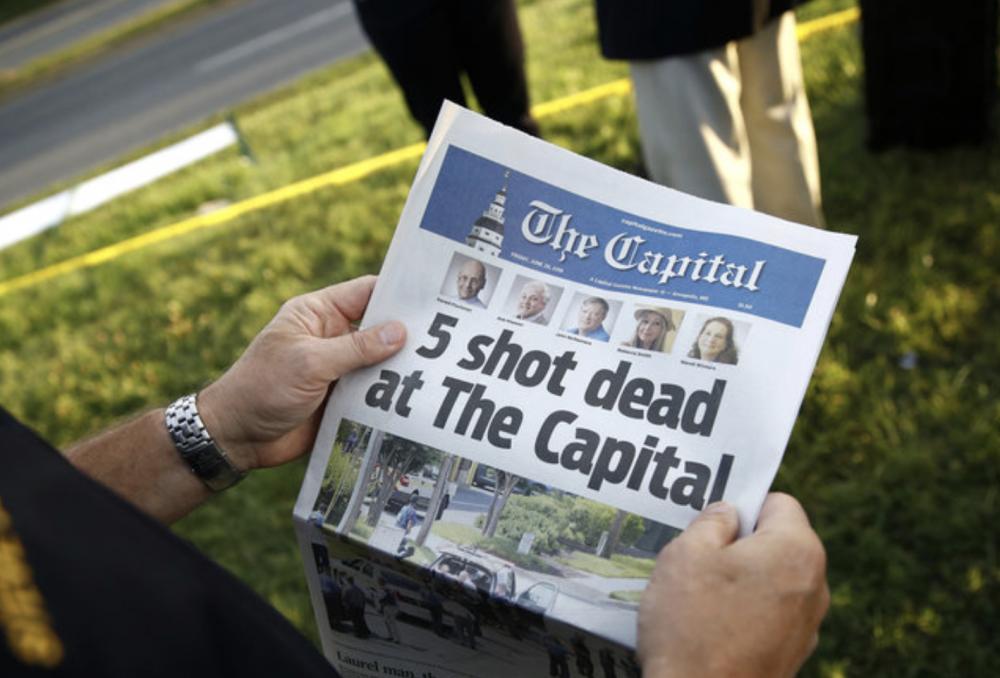We Americans like to commemorate public anniversaries of the ending of wars, assassinations of presidents and transformative leaders, passage of momentous federal legislation and, of course, the founding of our nation. These events of reverence and recognition give us a sense of place in our country, defining who we are, through whom, and what we honor and cherish.
As a former journalist and devout believer in the freedom of press as expressed in the First Amendment of our U.S. Constitution, I felt touched when reading about the first anniversary on June 28 of the gruesome murder of four journalists and an advertising assistant at the Annapolis Capital Gazette. A memorial garden was dedicated 11 days ago at Acton’s Cove Waterfront Park in Annapolis.
Family members, Capital employees and public figures attended the morning ceremony. On the same day, a moment of silence was observed at the time of the attack at 2:33 p.m. in the offices of the Capital, Baltimore Sun (part of the same media group as the Capital) and throughout the country.
The accused perpetrator of the worst attack on a newspaper in U.S. history will be tried on murder and other charges. He is pleading not criminally responsible. He had held a grudge against the newspaper for writing about a legal proceeding charging him with criminal harassment of a woman.
At a time when media outlets have come under unrelenting bombast by President Trump, characterized by him as the “enemy of the people,” I believe just the opposite. The media protects us from corruption and self-dealing in government, churches, military, corporations and every aspect of American life. It provides valuable information and insight that allow all citizens to feel part of their communities.
It represents the basic infrastructure for sustaining our freedom.
Unlike Russia and China, our news flows uncensored and uncontrolled. Consequently, news coverage of government leaders may be unflattering and disturbing. Truth remains the ideal; it triumphs over misinformation and manipulation.
Of course, inherent in the gathering of news and accurate reporting, the media—print and electronic—can be intrusive and bothersome. Good reporters, whether armed with a pen and pencil or a camera, are trained to “get the story and get it right,” often irritating the source.
The obligation of a media professional is to compose and produce a balanced piece of journalism.
“Balance” can be in the eyes of the beholder, or in many cases the subject of the coverage, as well as the public. What I think is balanced and fair may and does differ from someone either invested in the story, or reading/ watching it with a different point of view.
The scene in the Capital newsroom on June 28, 2018 was horrific. Yet, the staff still produced a newspaper that day. They did so while in shock. In the weeks and months following the senseless mayhem, reporters from newspapers throughout the country took leaves of absence from their normal jobs to help the Capital continue to serve the community.
In recounting yet another mass shooting in our nation, this one in a newsroom in a city known to many Spy readers, filled with followers of the First Amendment, I hark back to my unshakeable faith in the American press. I realize it’s less than perfect. Its practitioners may be careless at times. Bias on the news pages and daily broadcasts may be avoidable.
In 1823, Thomas Jefferson wrote his French friend, Marquis de Lafayette: “The only security of all is in a free press. The force of public opinion cannot be resisted when permitted freely to be expressed. The agitation it produces must be submitted to. It is necessary to keep the waters pure.”
Ironically, this American icon was often subject to the whims and wiles of a free, unfettered press.
Some anniversaries are bittersweet. Tragedy often underscores them. The five Annapolis Capital Gazette employees murdered senselessly deserve our heartfelt memorialization. A rose garden planted in their memory in an Annapolis park reminds us of the perils of a free press.
Columnist Howard Freedlander retired in 2011 as Deputy State Treasurer of the State of Maryland. Previously, he was the executive officer of the Maryland National Guard. He also served as community editor for Chesapeake Publishing, lastly at the Queen Anne’s Record-Observer. In retirement, Howard serves on the boards of several non-profits on the Eastern Shore, Annapolis and Philadelphia.



Write a Letter to the Editor on this Article
We encourage readers to offer their point of view on this article by submitting the following form. Editing is sometimes necessary and is done at the discretion of the editorial staff.